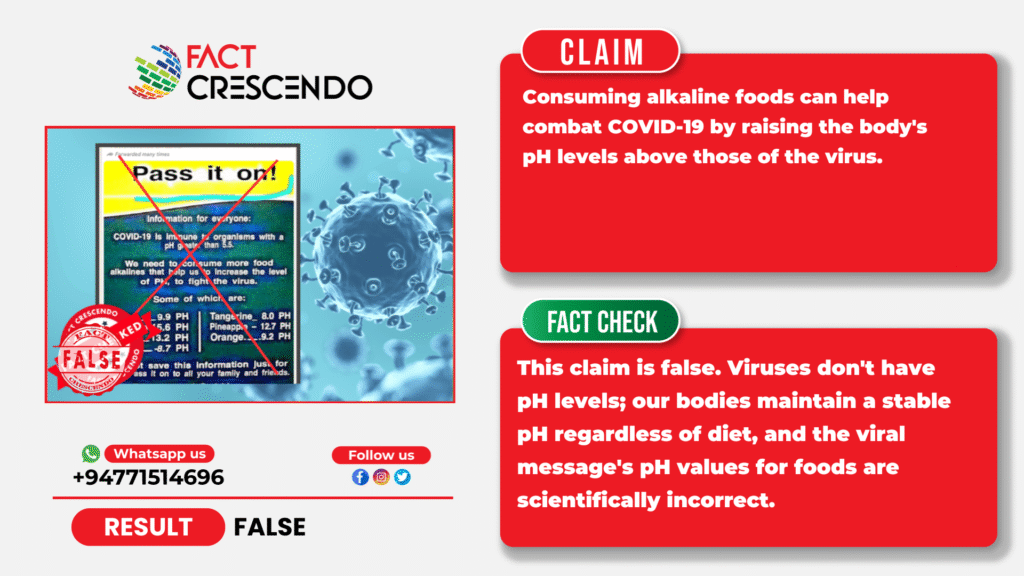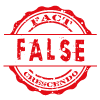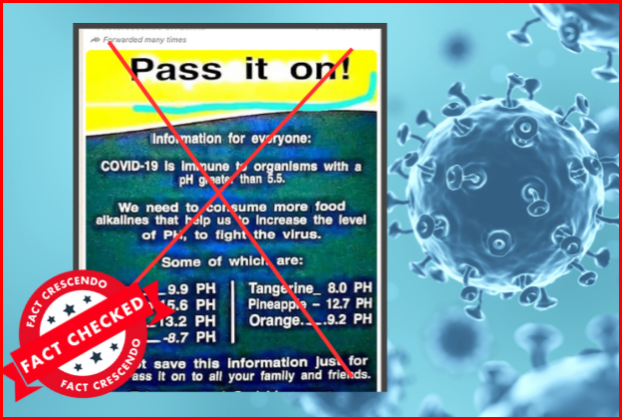
With the recent resurgence of COVID-19, some old myths about the disease have resurfaced, which were debunked a few years ago when the COVID-19 pandemic was wreaking havoc around the world.
One such claim is that consuming alkaline foods can help fight the coronavirus by raising the body’s pH levels above the virus’s purported optimal pH level. Let’s look at the viral message in detail.
Social Media Posts
A widely shared poster titled “COVID-19 is immune to organisms with a pH greater than 5.5” suggests that people should consume alkaline foods to fight the virus. As a result, the poster lists some of the recommended food items with purported pH levels greater than 7, as shown below.
The same claim has also been shared virally on WhatsApp.
But is there any truth in these claims? Let’s look at the facts.
Fact-Check
What is the pH scale?
The pH scale is used to measure how acidic or basic (alkaline) a liquid solution is, on a scale from 0 to 14:
- Solutions with pH 0-6.9 are acidic
- pH 7 represents neutral solutions like pure water
- Solutions with pH 7.1-14 are alkaline (basic)
Each whole number change in pH represents a tenfold change in acidity or alkalinity. For instance, pH 4 is ten times more acidic than pH 5. (Source)
This scale only applies to aqueous (water-based) solutions. Viruses like SARS-CoV-2 are biological particles, not solutions, so they cannot have pH values.
Inaccurate pH Values for Listed Foods
The claim’s pH values for foods are scientifically incorrect:
- Lemon juice: pH approximately 2.0 to 3.0, typically around 2.0 to 2.6 (acidic).
- Avocado: Near neutral to slightly acidic, with a pH of 6.3 to 6.6 (not highly alkaline and nowhere near pH 14, as food chemistry demonstrates).
- Garlic: Slightly acidic to neutral, with a pH between 5.3 and 6.3 (not alkaline as claimed)[based on food science principles].
- Mango: Slightly acidic, with a pH between 5.8 and 6.0 (not alkaline, consistent with typical fruit pH ranges).
- Tangerine: Acidic, approximately pH 3.0 to 4.1.
- Pineapple: Acidic, about pH 3.2 to 4.0 (not alkaline, as widely documented in food science literature)
- Orange: Acidic, with a pH between 3.5 and 4.0 (not alkaline).
These pH values are fundamentally incorrect and invalidate the entire premise of the claim (Source: 1, 2, 3).
Experts Confirm – Viruses Do Not Have a pH Level.
The coronavirus does not have a pH value. Viruses are not solutions; they consist of genetic material within a protein capsid. They cannot be measured for acidity or alkalinity. pH measurements only apply to aqueous solutions and their hydrogen ion concentrations. This metric is irrelevant when discussing viruses. (Source)
Dr. Sharad Kale, a veteran scientist from India’s Bhabha Atomic Research Centre, told Fact Crescendo that: “The coronavirus does not have a pH. This statement is baseless… scientifically wrong, which makes it meaningless to claim that alkaline foods can prevent coronavirus infection.”
He further emphasised that while a healthy diet is essential, it does not protect against COVID-19. Instead, people should follow public health guidelines from organisations like the World Health Organisation (WHO).
Sarah Stanley, Associate Professor of Infectious Diseases, further clarified that pH only applies to water-based solutions, and diet cannot alter the body’s tightly regulated pH levels in blood, cells, and tissues. While a healthy diet supports general immunity, there is no evidence that alkaline foods specifically help prevent or treat COVID-19. (Source)
MD Anderson Cancer Centre also explained that the body maintains strict pH regulation in blood (7.35-7.45) through respiratory and renal mechanisms. While dietary changes may influence urinary pH, they cannot alter blood or cellular pH levels.
Source of Confusion: The message may stem from a misreading of a 1991 study in the Journal of Virology, which examined how pH levels affected cell fusion in mouse cells infected with a different coronavirus (MHV4). The research did not claim that viruses themselves have pH values, nor did it relate to SARS-CoV-2 or support the use of alkaline foods in prevention.
Additionally, the myth about “alkaline foods fighting disease” has circulated online for years and has been repeatedly debunked by scientists and medical professionals. Read more about an alkaline diet here and here.
Sri Lankan health officials request that the public follow reliable sources of information.
Associating COVID-19 with pH levels was previously widely shared in Sri Lanka as well, falsely linking it to the UN and IDH Hospital, among others. The concerned parties refuted them, and the Health Promotion Bureau of Sri Lanka advised the public not to believe such information being spread without a scientific basis and to refer only to information released by institutions that provide reliable information throughout the COVID-19 pandemic.
Read the Sinhala language fact check here.
Resurgence of COVID-19 and the NB.1.8.1 Variant in 2025
COVID-19 cases have increased globally in 2025 due to the emergence of variant NB.1.8.1. The variant, initially identified in China, has now spread to multiple countries, including India and the United States. (Source)
According to GISAID, the global database for tracking virus mutations, NB.1.8.1 was first seen in late April 2025 in travellers from China, France, Japan, the Netherlands, South Korea, and other countries. It is now the dominant strain in China, contributing to a spike in hospital visits.
Symptoms of NB.1.8.1: This Omicron descendant presents with symptoms similar to those of past variants, including sore throat, fever, cough, and fatigue. While it may spread more easily, current evidence does not suggest it causes more severe illness.
Do Vaccines Still Work?
Yes. Since NB.1.8.1 is a variant of Omicron, people who have had previous infections or recent JN.1 vaccines still have good protection against severe illness.
The FDA met on May 22, 2025, to review whether vaccines should be updated to target LP.8.1 (a variant similar to NB.1.8.1). Although Pfizer and Moderna have developed new vaccines with broader protection, the FDA decided to maintain the current JN—1 vaccine for now.
While vaccines are still recommended for older adults and people at higher risk, new U.S. health policies suggest that healthy children, pregnant women, and adults may no longer be routinely recommended for vaccination, pending further safety and efficacy data. (Source)
Conclusion
Claims that alkaline foods can fight coronavirus are scientifically incorrect. Viruses don’t have pH values, and the message lists wrong pH values for common foods; many naturally acidic foods are incorrectly labelled as alkaline. The pH scale ranges from 0 to 14, and the body maintains a strict blood pH level of 7.35 to 7.45, regardless of diet. There is no scientific evidence that an alkaline diet helps kill the virus.

Title:FALSE: Alkaline Foods Cannot Fight COVID-19 as Viruses DO NOT Have pH Levels
Fact Check By: Cielito WangResult: False






